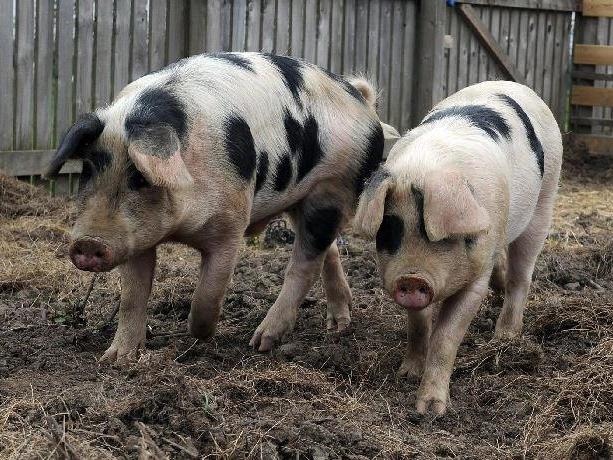School makes children raise pigs before sending animals to be slaughtered, dividing parents and campaigners
Headmaster says scheme will teach children about food provenance and animal welfare

A primary school’s plan to slaughter two young pigs that have been reared by pupils on its mini farmyard has found itself at the centre of a heated debate between parents and campaigners.
The Gloucestershire Old Spots pigs arrived at Farsley Farfield Primary last October and have lived on the school’s grounds, which also contains vegetable patches and hens.
Headmaster Peter Harris argues that the scheme teaches children about food provenance and animal welfare, but critics have branded the plans “cruel” and “traumatising”.
The plans came to light after a former pupil launched a petition claiming it would teach children “that it is OK to exploit and kill animals with the only justification being that people enjoy eating their bodies”. The petition has since gained more than 2,000 signatures.
The petition, set up on change.org, claims that parents will be able to buy the meat from the animals after they have been sent to a slaughterhouse.
The school said no decision had been made on how the pigs’ meat would be sold, according to local media.
The scheme gained its most notable advocate in the form of Charlotte Heap, an 11-year-old pupil at the Leeds school, who leapt to Mr Harris’s defence in a letter to the Yorkshire Evening Post.
She wrote that Mr Harris was himself a vegetarian and had been clear with pupils of his intentions for the animals from the outset.
She pointed out that the school had previously won national acclaim for its forward-thinking ideas – it was named “Healthy School of the Year” by the Times Educational Supplement in 2017.
“We are being given a real demonstration of where our meat comes from,” Charlotte wrote. “We know that not all animals are treated well but we all want this to change.”
Mr Harris said the pig would live twice as long as their commercial counterparts, which are fed growth-inducing hormones and often considered ready for slaughter at just five months old.
The UK farms around 10 million pigs each year, the vast majority of which grow up on battery farms.
The majority of piglets on such farms are thought to have their tails docked, which is an illegal practice when done routinely.
At the end of their short lifespan, they are normally gassed in groups before being sent to abattoirs, using substances considered inhumane by campaigners.
As stated in the petition, pigs are thought to have intelligence levels similar to those of three-year-old children, and higher than those of cats and dogs.
According to the headmaster, a key element of the project is an emphasis on the need to reduce meat consumption.
Farsley Farfield Primary has one meat-free day each week and there are boards at the farm explaining why meat consumption must be reduced.

In response to critics, Mr Harris wrote online: “I don’t think that we are desensitising the children, I suggest that our children will be more knowledgeable and sensitive to animal welfare than most of their peers.”
While pupils have been encouraged to feed and engage with the animals, they have been told from the outset not to think of them as pets.
Charlotte’s letter was testament to the pragmatic outlook potentially fostered within pupils by the animals’ presence.
“This was always the plan for these pigs,” she said. “We took them in so that they could have a better life while they were alive. No one is upset about sending the pigs off at the end of the year.”
While the petition has garnered increasing attention and rallied the ire of several parents, many responded positively to the scheme online.
One parent wrote: “Despite some individuals’ views on social media I think having the pigs on the farm is a brilliant idea.
“All of my children have been brought up knowing where our food comes from and it does not stop them eating any of it.”
Another said: “All of my children have attended this great school.
“I fully support the teaching of the pig’s life cycle, children should be made aware of where their food comes from.”
Mr Harris reportedly consulted with religious families at the start of the process to discuss the extent to which their children would interact with the animals.
Additional reporting by SWNS
Join our commenting forum
Join thought-provoking conversations, follow other Independent readers and see their replies
Comments
Bookmark popover
Removed from bookmarks